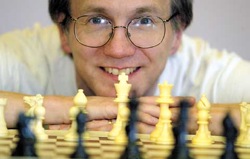I’m going off topic today to promote a book written by a friend of mine. This is a copy of the review that I posted at goodreads.com.
 Through the Shadowlands: A Science Writer’s Odyssey Into an Illness Science Doesn’t Understand by Julie Rehmeyer
Through the Shadowlands: A Science Writer’s Odyssey Into an Illness Science Doesn’t Understand by Julie Rehmeyer
My rating: 5 of 5 stars
I hope this book wins a Pulitzer Prize. It’s that good.
On the simplest level, “Through the Shadowlands” is a memoir of the author’s experience with chronic fatigue syndrome (referred to throughout the book by its less catchy acronym, ME/CFS), and most of its audience will probably read it for that reason. But it’s so much more. It is also:
A mystery, as the author tries to understand her illness;
An expose, as she reveals the scientific malpractice that has contributed to our current state of ignorance about it;
An unflinching look back at her life and childhood;
A story about the healing of a broken family;
A spiritual journey, a literal trip to the Valley of Death and out the other side;
And finally, a love story.
To call this a book about an illness would be to miss half the point!
Nevertheless, let’s start with the illness. For a long time, I’ve been a closet fan of books about illnesses. Even when I was still in grade school, I was touched by Karen and had the wits scared out of me by Death Be Not Proud. In graduate school I was blown away by The Siege: A Family’s Journey Into the World of an Autistic Child, which to me is the all-time classic of the genre.
I think that the reason I like these books so much is that life-threatening and life-altering diseases transform ordinary people into heroes. They force us to ask what is important in life.
What makes Julie Rehmeyer’s book stand out from the others is her voice. While taking us on this amazing journey, she never acts as if she has all the answers. There is never an ounce of self-pity, either. What comes through so clearly is her wry sense of humor as she observes herself, observes her body’s epic fails, observes her own skepticism about miracle cures… until a minor miracle practically hits her in the face. At the same time, she is way too smart to say, “Try what I did, it’ll work for you too.” She is as baffled as anyone else by what happened. But she is also very genuinely grateful. Most remarkably, one has the feeling that she would be grateful even if her disease had not abated, because it led her to a state of grace in which she could appreciate everything that life gave her. Over and over she says, “I died out there in the desert. Everything else is all extra.”
In the end, she succeeds in doing what Clara Claiborne Park did in “The Siege.” She takes us on the full spiritual journey of the illness, without stinting and without exaggerating. Like Park, she has to deal with a medical establishment that doesn’t believe her and that blames the disease on her. Like Park, she does not let herself get consumed by bitterness or despair; she moves on and finds her own way. I don’t want to give too much away, but in both books a very large part of the answer is love. I’m not talking about some hippy-dippy version of love, but a tough and practical love that scoops her up off the floor when paralyzed, accepts her for exactly who she is and doesn’t expect her to be anything different.
Now take this wonderful story about a spiritual journey, and add to it the fact that this book could be a game-changer for science. Just as Park’s book changed minds about autism, Rehmeyer’s book will change minds about chronic fatigue syndrome.
First of all, chronic fatigue syndrome is not about being tired. It is not in the patient’s mind. It is a physiological reality that, in some cases at least, has external physical causes. Yet scientists are still groping for ways to identify those causes, and one reason they are still groping is lack of money. While some diseases are awash in research funds, ME/CFS research struggles along on a pittance, precisely because it was so long thought to be psychosomatic. In the real world of medicine, miracles only come about through hard work and they require funding. I hope and believe that Rehmeyer’s book will legitimize the field so that people in the future will not have to stumble blindly into the desert with nothing but a hope and a prayer.
Disclaimer: Julie Rehmeyer is a friend of mine. It doesn’t matter. You should still read this book.


